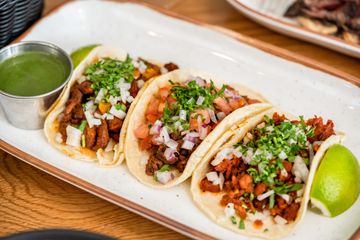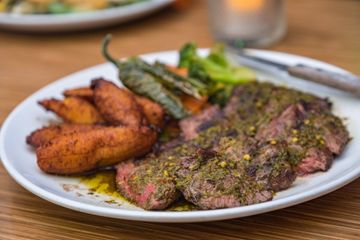Make every bite delightful with lunch and dinner favorites that bring out Mexico’s finest dishes
Is Mexican Food Healthy? Unpacking the Nutritional Conveniences of Typical Active Ingredients
The inquiry of whether Mexican food is healthy invites an expedition of its typical ingredients. Beans and corn act as fundamental staples, abundant in protein and fiber. Avocados provide valuable fats, while different herbs and spices add flavor and wellness advantages - hand crafted margarita. Together, these parts produce a tapestry of nutrition. The healthfulness of Mexican cuisine often depends on preparation methods and section dimensions. What duty do these elements play in identifying its overall dietary worth?
The Power of Beans: Healthy Protein and Fiber-Rich Staples
Commonly ignored, beans offer as a keystone of Mexican cuisine, using a riches of nutritional advantages. Rich in protein, they are an outstanding plant-based choice for those looking for to fulfill their dietary protein requires. This high protein material supports muscle mass repair service and development, making beans indispensable for both meat-eaters and vegetarians alike. Additionally, beans are an outstanding resource of dietary fiber, which helps in food digestion and promotes a feeling of volume, possibly aiding with weight monitoring.
The range of beans made use of in Mexican meals, such as black beans, pinto beans, and kidney beans, contributes to a varied taste profile and can improve dishes nutritionally. Moreover, beans are low in fat and consist of vital minerals and vitamins, including folate, iron, and magnesium. With each other, these qualities make beans a vital component, providing both nutrients and food in conventional Mexican price.

Corn: a Versatile Grain With Nutritional Perks
Corn stands out as a flexible grain basic to Mexican cuisine, celebrated not just for its cooking applications yet additionally for its remarkable dietary profile. As a key ingredient in dishes like tortillas, tamales, and pozole, corn provides vital nutrients that add to a well balanced diet regimen. Rich in carbohydrates, it serves as a considerable power source, while likewise being reduced in fat, making it a favorable option for various nutritional needs.
Corn is a good resource of dietary fiber, which helps in food digestion and promotes satiety. It has significant amounts of vitamins such as B-complex vitamins, which are essential for energy metabolism. The existence of antioxidants, specifically carotenoids, contributes to total wellness by minimizing oxidative anxiety. In addition, corn is gluten-free, providing to those with gluten level of sensitivities. Overall, the nutritional advantages of corn highlight its significance in typical Mexican food and its function in a healthy and balanced diet.
Avocados: Healthy And Balanced Fats and Nutrients in Every Bite
Avocados play a considerable duty in Mexican cuisine, enhancing meals with their luscious structure and rich taste. Past their culinary charm, avocados are celebrated for their remarkable dietary account. They are a rich source of healthy monounsaturated fats, which can help lower bad cholesterol degrees and assistance heart wellness. In addition, avocados are packed with necessary nutrients, including potassium, vitamin E, and B vitamins, adding to overall health.
The high fiber content in avocados aids digestion and advertises satiation, making them a useful addition to any type of meal. Their one-of-a-kind nutrient composition can additionally support skin wellness and offer anti-inflammatory benefits. Incorporating avocados right into traditional Mexican meals or appreciating them as a standalone treat can boost both taste and nutrition, demonstrating why they are a beloved staple in Mexican cuisine. Generally, avocados provide a delicious way to appreciate healthy fats el cholo and essential nutrients in every bite.
Herbs and spices: Flavorful Wellness Boosters
While taking pleasure in the abundant tastes of Mexican food, one can not overlook the important function that spices and herbs play in enhancing both taste and health. Components such as cilantro, oregano, and chili peppers not only add to the dynamic taste profile but also provide substantial health benefits. Cilantro is recognized for its detoxifying buildings, helping to get rid of hefty steels from the body, while oregano is packed with anti-oxidants and useful content has anti-inflammatory effects.
Chili peppers, a staple in lots of Mexican recipes, have capsaicin, which has actually been connected to boosted metabolic process and pain alleviation. In addition, seasonings like cumin and coriander support food digestion and may help in blood glucose law. Including these tasty health and wellness boosters right into dishes not just improves the culinary experience yet also promotes total well-being, making Mexican cuisine not just delicious, however also nutritionally beneficial.
Standard Food Preparation Methods: Enhancing Nutrition and Taste
Standard food preparation approaches in Mexican cuisine play an essential duty in enhancing both nourishment and flavor, as they often focus on classic techniques and fresh active ingredients. Techniques such as nixtamalization, where corn is saturated and prepared in an alkaline service, not only boost the nutrient profile of tortillas but also improve their digestibility - tacos. In addition, the usage of slow-moving cooking approaches, like cooking or braising, enables tastes to blend beautifully while maintaining the integrity of the active ingredients

Often Asked Concerns
Are Mexican Food Portions Normally Larger Than Other Foods?
Mexican food sections are typically larger than those of several various other cuisines. This particular reflects typical dining methods, highlighting communal sharing and hearty meals, which can lead to an extra considerable offering dimension in general.
Exactly how Does the Preparation Technique Affect Healthfulness of Mexican Food?
Prep work approaches considerably affect the healthfulness of Mexican food. Strategies such as barbecuing or steaming maintain nutrients, papa murphy's near me while frying can enhance undesirable fat web content. Selections of active ingredients and cooking designs eventually determine general nutritional worth.
Can Mexican Food Be Customized for Certain Nutritional Restrictions?
Mexican food can undoubtedly be customized for certain nutritional restrictions. Substitutions, such as making use of corn tortillas for gluten-free diets or incorporating more veggies, allow people to appreciate standard flavors while accommodating various nutritional requirements.
What Are Usual Misunderstandings Concerning Mexican Food and Wellness?
Common false impressions concerning Mexican food consist of the belief that it is naturally undesirable, extremely spicy, and only concentrated on fats. In fact, traditional recipes usually feature nourishing ingredients and can be customized to various nutritional requirements.
Exist Much Healthier Options at Mexican Restaurants?
Healthier options at Mexican restaurants frequently include grilled meats, beans, and fresh vegetables. Selecting recipes that stress whole active ingredients and preventing hefty sauces can result in a much more nourishing dining experience, promoting overall wellness.
The variety of beans utilized in Mexican meals, such as black beans, pinto beans, and kidney beans, contributes to a varied taste profile and can improve meals nutritionally. Avocados play a significant role in Mexican cuisine, matching dishes with their velvety structure and rich taste. Incorporating avocados into conventional Mexican dishes or appreciating them as a standalone treat can improve both flavor and nutrition, showing why they are a beloved staple in Mexican cuisine. While appreciating the rich tastes of Mexican cuisine, one can not neglect the crucial function that spices and herbs play in improving both taste and health and wellness. Typical food preparation methods in Mexican food play an essential role in enhancing both nutrition and taste, as they frequently focus on fresh ingredients and classic techniques.